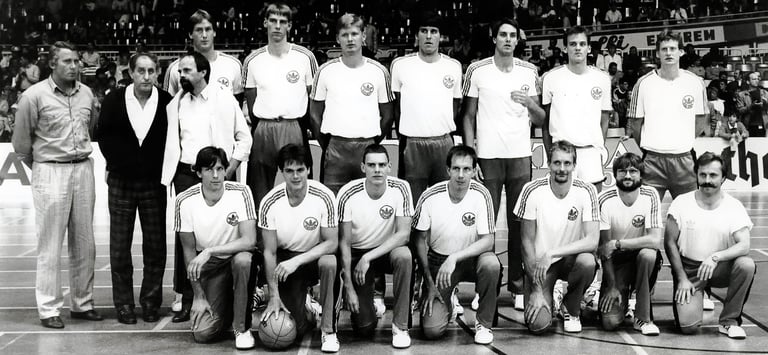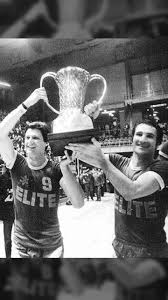
Ralph Klein
"The Father of Israeli Basketball”
RETROCOACHES
Antreas Tsemperlidis
7/3/20254 min read


In 1993, the German national basketball team was the unexpected protagonist in winning the EuroBasket. With leaders like Welp, Koch, Harnisch, and Jakel and under the technical guidance of Pesic, the Germans took advantage of their home court and the historic changes that had occurred in Europe over the previous two years, with Munich once again confirming its reputation as the place of great upsets.
In the stands of the Olympia Halle was a man whose contribution to German basketball was so great that he is still considered a reformer. This was Ralph Klein, the greatest coaching figure to emerge from Israel, a pioneer for the two countries that marked his life and career.
Klein was born of Jewish descent in Berlin on July 29, 1931. In 1933, when the Nazis came to power, his father, seeing the dark clouds on the horizon, took his family and emigrated to Hungary, believing they would be safe from the coming storm. Unfortunately for the Klein family, the Nazi boot also stepped into Budapest, as Hungary allied with Germany in World War II, and his father was deported to Auschwitz, never to return. Ten-year-old Ralph, his mother, and his siblings escaped death thanks to the efforts of Swedish diplomat Raoul Wallenberg, who, risking his own life, provided over 350 Jewish families and thousands of people with forged passports, saving them from the hell of the concentration camps. When the war ended, Ralph, now 14, found an outlet in sports, initially in football, but his interest quickly turned to basketball, as the Hungarian national team was among the powers of that era. All this lasted until 1951 when the remaining Klein family members once again took the road of exile, becoming targets of the regime, as the Nazis had been replaced by the communist government. This time, they returned to their roots, with the newly established state of Israel opening its arms to welcome the Jews of the diaspora.
Klein joined the roster of Maccabi Tel Aviv, beginning to write the first pages in the “Bible” of Israeli basketball. With the young guard as their leader, the team won six championships and eight cups until Klein’s retirement in 1964, with Klein serving as captain in most of them, a role he also held on the national team, participating in four EuroBaskets (1953, 1959, 1961, 1963), the 1952 Olympic Games, and the 1954 FIBA World Championship. In 1969, after first gaining experience with Hapoel Haifa, Hapoel Tel Aviv, and Israel’s youth national team, the team of his heart, Maccabi, called him and handed him the keys to the head coach position.


Until 1972, when he left for Hapoel Jerusalem, he won two championships without European success, but at the same time, he realized how influential Tal Brody was in Maccabi’s game. Klein returned to “Yad Eliyahu” in 1975 and began building the team that would reach the top of Europe in 1977 through challenging paths. In the European Champions Cup’s final six, Maccabi was called to face CSKA Moscow under Sergei Belov on neutral ground in Virton, Belgium, as the Soviets did not recognize Israel and refused to travel to Tel Aviv. In a packed arena with 5,000 Israelis, with only the KGB Soviet agents supporting CSKA, as Sergei Belov himself admitted, Maccabi won 91-79, and this victory gave birth to Tal Brody’s historic phrase, “Anachnu al hamapa, ve’anahnu nisharim al hamapa” (“We are on the map, and we will remain on the map”), as Israel, through sports, declared its existence. And the seal of this declaration came in April in the Belgrade final with the victory of the “People’s Team” over Italy’s Varese, with Maccabi and Klein becoming European champions for the first time.
There was also continuity through the national team with Klein at the helm. In the 1979 EuroBasket, the Israelis, led on the court by Miki Berkovich, defeated Yugoslavia and Spain, reaching the final only to lose to the Soviet Union. Ralph also contested the European Champions Cup with Maccabi in 1980 and 1982 without repeating the success of 1977. However, under his guidance, the Tel Aviv team established itself as a European powerhouse, with “Yad Eliyahu” becoming a formidable home court for any opponent.


Ralph was one of Europe’s top coaches, a symbol for Maccabi and Israel, so his 1983 announcement that he would move to West Germany to coach Saturn and the national team was shocking. This act of Klein says much about his character and the mental strength of a man who wanted to close the unfinished circle of his life where it had begun, a symbolic gesture directed at both Israel and Germany. However, Klein did not stop at symbolism, he worked as he knew best, with consistency and effectiveness. In 1984, West Germany qualified for the Los Angeles Olympic Games, and the following year, at its own EuroBasket, it achieved a fifth-place finish, its best until then. The foundations for the 1993 miracle in German basketball were laid during Klein’s tenure, by the Israeli Ralph Klein.
The man expelled from the country of his birth had conquered his personal demons, as he himself said, “mighty Germany turned to a Jew to coach its national team.” After the 1987 EuroBasket in Athens, he resigned from the national coach position and returned to Israel for another stint with his beloved Maccabi, winning another championship.
Even though he was battling cancer, he never abandoned coaching, leading five more teams and, at 75 years old in 2006, even stepping into women’s basketball. This great coach, the “Father of Israeli Basketball,” passed away on August 7, 2008, having received great honors in Israel. The greatest of all, however, was the universal recognition in both his homelands, the respect for the courage he showed in reclaiming a piece of himself that he had unwillingly left behind in the country where he was born.
He wanted to close an open wound, and the way he chose was through his work, as a man who, above all, loved basketball, and this love led him to overcome obstacles, to return to where it all began…


